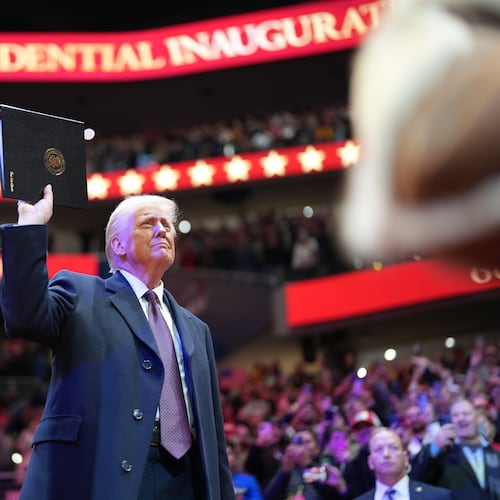Deval Patrick ended his bid for the Democratic White House nomination on Wednesday.
The former Massachusetts governor was expected to announce the end of his campaign in an email to supporters, according to CBS News. Patrick confirmed the news to CNN, saying "the vote in New Hampshire last night was not enough for us to create the practical wind at the campaign's back to go on to the next round of voting. So I have decided to suspend the campaign, effective immediately."
Patrick finished with less than 1 percent of the vote in Tuesday's New Hampshire primary.
Patrick served as Massachusetts' 71st governor from 2007 to 2015, following Mitt Romney, the current Republican U.S. senator from Utah who failed in his bid to stop Barack Obama's reelection in 2012. Romney also has drawn the ire of President Donald Trump and Republicans nationwide for siding with Democrats to impeach the president on one of two impeachment articles.
»Full results of New Hampshire primary
Patrick joins Andrew Yang and Michael Bennet, who both ended their bids after poor Granite State showings.
U.S. Sen. Bernie Sanders narrowly won the New Hampshire primary over second-place finisher Pete Buttigieg, former mayor of South Bend, Ind.
U.S. Sen. Amy Klobuchar surged to a third-place finish in the nation’s first primary, while U.S. Sen. Elizabeth Warren and former Vice President Joe Biden face questions about whether they have a path to victory.
»MORE: Nevada Dems promise not to follow Iowa’s debacle of a caucus
Yang, an entrepreneur who created buzz for his presidential campaign by talking about his love of math and championing a universal basic income that would give every American adult $1,000 per month, said “it is clear to me from the numbers that we are not going to win this race."
»MORE: Andrew Yang ends presidential bid as N.H. primary results come in
“This is not an easy decision, or something I made lightly with the team. Endings are hard and I’ve always had the intention to stay in the race until the very end,” he added. “ But I have been persuaded that the message of this campaign will not be strengthened by my staying in the race any longer.”
The 45-year-old was one of the breakout stars of the Democratic primary race, building a following that started largely online but expanded to give him enough donors and polling numbers to qualify for the first six debates.
He outlasted senators and governors, and after initially self-funding his campaign, he raised more money than most of his rivals, bringing in over $16 million in the final quarter of last year.
Bennet, 55, was a late entrant to the race who staked his bid largely on trying to win New Hampshire. He only formally announced his candidacy in late April, after completing treatment for prostate cancer. He was the seventh senator and second white Colorado moderate to join the field, which made it difficult for him to stand out.
»Important 2020 election dates
“We weren't able to get much in the way of name identification in the state,” Bennet said shortly after polls closed in New Hampshire. “We didn't have the resources to compete. ... I’m frustrated because I think we did have something to contribute in terms of the agenda.”
About the Author
The Latest
Featured


